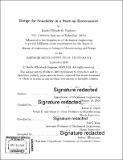| dc.contributor.advisor | David E. Hardt and Maria Yang. | |
| dc.contributor.author | Deghuee, Rachel Elizabeth. | en_US |
| dc.contributor.other | Massachusetts Institute of Technology. Department of Mechanical Engineering. | en_US |
| dc.date.accessioned | 2021-10-08T17:10:12Z | |
| dc.date.available | 2021-10-08T17:10:12Z | |
| dc.date.copyright | 2018 | en_US |
| dc.date.issued | 2018 | en_US |
| dc.identifier.uri | https://hdl.handle.net/1721.1/132872 | |
| dc.description | Thesis: M. Eng. in Advanced Manufacturing and Design, Massachusetts Institute of Technology, Department of Mechanical Engineering, September, 2018 | en_US |
| dc.description | Cataloged from the PDF version of thesis. | en_US |
| dc.description | Includes bibliographical references (pages 61-62). | en_US |
| dc.description.abstract | Rising labor costs and increasing demand for restaurant food has led to a shortage of restaurant workers. Restaurant owners are having difficulty finding staff while maintaining profit margins. Miso Robotics, based in Pasadena, California, produces an Al-guided robot that automates the most arduous kitchen tasks. The Miso Robotics Kitchen Assistant, colloquially known as "Flippy," began serving the public in March of 2018. Three students from MIT's Advanced Manufacturing and Design program were selected to help prepare the product for full-scale deployment. Due to resource constraints, many start-up companies cannot implement mature manufacturing processes. However, viable improvements that suit the company and set it up for the early stages of manufacturing and scaling were made. Mechanical design and manufacturing in a start-up environment differs from designing at a larger, well established company. The relative importance of cost, lead time, reliability, supplier selection, and design turnaround differ due to the prioritization on base functionality over repeatable design. Transitioning from a prototype to a production-ready design must be done carefully to ensure company success. Three case studies are examined to analyze the transition from prototype design for pilot installations, to limited deployment, to wide-scale implementation. This thesis serves as a guide for future design and process changes necessary to meet anticipated demand are provided for any hardware startup. | en_US |
| dc.description.statementofresponsibility | by Rachel Elizabeth Deghuee. | en_US |
| dc.format.extent | 62 pages | en_US |
| dc.language.iso | eng | en_US |
| dc.publisher | Massachusetts Institute of Technology | en_US |
| dc.rights | MIT theses may be protected by copyright. Please reuse MIT thesis content according to the MIT Libraries Permissions Policy, which is available through the URL provided. | en_US |
| dc.rights.uri | http://dspace.mit.edu/handle/1721.1/7582 | en_US |
| dc.subject | Mechanical Engineering. | en_US |
| dc.title | Design for scalability in a start-up environment | en_US |
| dc.type | Thesis | en_US |
| dc.description.degree | M. Eng. in Advanced Manufacturing and Design | en_US |
| dc.contributor.department | Massachusetts Institute of Technology. Department of Mechanical Engineering | en_US |
| dc.identifier.oclc | 1263579740 | en_US |
| dc.description.collection | M.Eng.inAdvancedManufacturingandDesign Massachusetts Institute of Technology, Department of Mechanical Engineering | en_US |
| dspace.imported | 2021-10-08T17:10:12Z | en_US |
| mit.thesis.degree | Master | en_US |
| mit.thesis.department | MechE | en_US |
